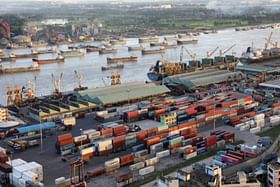Connectivity is one of the critical enablers for ports driving end-to-end effectiveness of the logistics system, impacting turnaround time and the country’s trade competitiveness.
All major ports in the country are connected by rail and by four-lane road or national highways, Union Minister for Ports, Shipping and Waterways Sarbananda Sonowal informed Parliament on Tuesday (8 August).
The 12 major ports in India include Deendayal (formerly Kandla), Mumbai, Jawaharlal Nehru Port (JNPT), Mormugao, New Mangalore, Cochin, Chennai, Kamarajar (previously Ennore), VO Chidambaranar, Visakhapatnam, Paradip, and Kolkata (including Haldia).
Similarly, as per the information received from the state governments, out of the 66 non-major ports handling cargo, 13 are connected by rail while 24 are connected by four-lane roads or national highways.
Port connectivity is one of the critical enablers for ports driving end-to-end (E2E) effectiveness of the logistics system. Connectivity challenges exist in India impacting ports’ turnaround times and the country’s trade competitiveness.
India’s hinterland connectivity is mainly based on surface transport i.e. road and rail, wherein, domestic waterways (coastal shipping and inland waterways) play a very limited role.
It is, therefore, important that connectivity of major ports with the hinterland is augmented not only to ensure smooth flow of traffic at the present level but also to meet the requirements of projected increase in traffic.
Smooth connectivity to ports is even more important as the cargo generating centres are mainly in the hinterland instead of in the coastal region. The long lead distance increases the logistics cost and time variability within which the cargo can be delivered.
To this end, the Department for Promotion of Industry and Internal Trade (DPIIT) prepared a Comprehensive Port Connectivity Plan (CPCP) in consultation with Ministry of Ports, Shipping and Waterways, Ministry of Railways, Ministry of Road Transport and Highways (MoRTH) and State Maritime Boards in September 2022.
The CPCP incorporates 298 connectivity projects, both road and rail, which are currently enhancing last mile and hinterland connectivity of ports. This, in turn, will boost port efficiency, enabling the ports to handle more cargo.
These road and rail infrastructure gap projects are primarily undertaken by the Ministry of Railways and Ministry of Road Transport and Highways on a priority basis.


